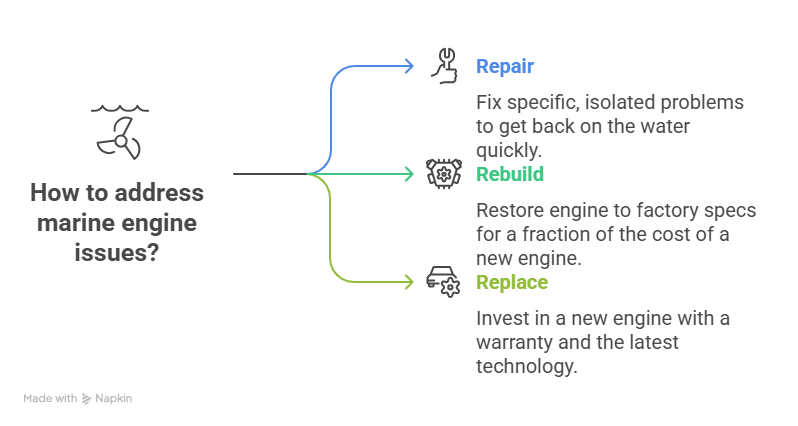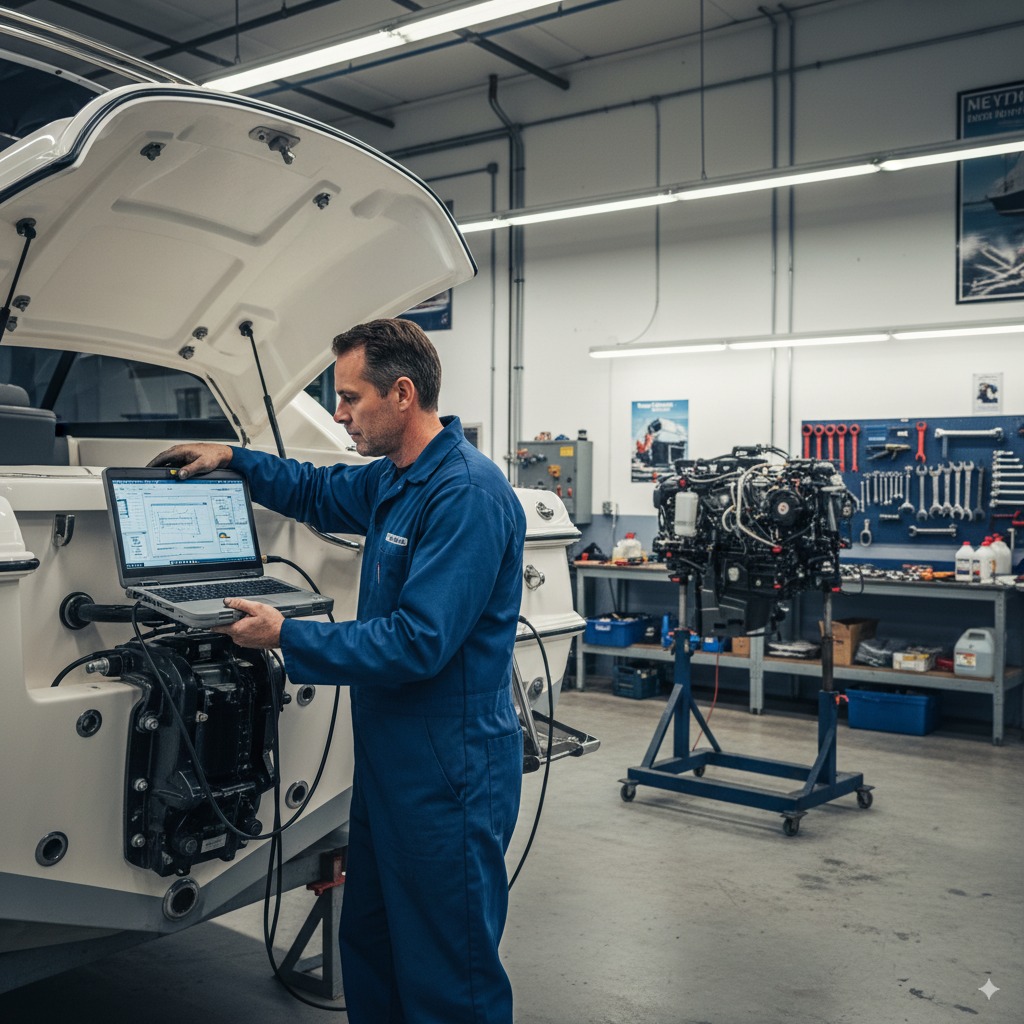I’ve been a marine mechanic in South Florida for over 15 years, and if there’s one thing I’ve learned, it’s that a boat engine will always find the most creative way to ruin a perfect day. One minute you’re cruising off Key Biscayne, the next you’re dead in the water with a sound coming from the engine bay that just… isn’t right.
I remember a client, a guy named Ray with a 28-foot Grady-White. He’d been ignoring a slight hesitation when he’d throttle up. He figured it was nothing. Then, on his way back from Stiltsville, the engine quit entirely. The tow back to the marina cost him a small fortune, and the eventual fix was a major marine engine repair job on a fuel system that had been slowly failing for months. He could have caught it early with a simple diagnostic check.
That’s the thing about marine engine repair—it’s rarely about one big, sudden failure. It’s usually a story of small warnings that get ignored. This guide is my attempt to share what I’ve seen on the shop floor. It’s not just about fixing what’s broken; it’s about understanding the heart of your boat, keeping it healthy, and knowing when to call for help. This is the real-world stuff that keeps you on the water and out of my repair bay.
Table of Contents
Why You Can’t Ignore Your Engine
Your engine is the heart of your boat. When it’s happy, you’re happy. When it’s not, you’re stuck. Ignoring engine trouble is one of the most expensive mistakes a boat owner can make.
I’ve seen it a hundred times: a small oil leak becomes a seized engine. A little stumble becomes a full fuel system replacement. A proper marine engine repair mindset starts with proactive attention. You have to listen to your engine. That new vibration, that puff of smoke, that slight drop in RPM—that’s your engine talking to you. Ignoring it is like ignoring a chest pain. You just don’t do it. A timely check-up can be the difference between a minor adjustment and a catastrophic failure that puts your safety and your wallet at risk.
How We Find the Problem: Diagnostics Done Right
In the old days, marine engine repair was all about listening and feeling. We still do that, but now we have some incredible tools to help us see what’s going on inside. Modern marine engines have an ECM—an onboard computer—that logs everything.
When a boat comes into my shop, the first thing I do is plug in my diagnostic scanner. It tells me the engine’s story: fault codes, engine hours, how it’s been run. It’s like a black box for your boat. This is crucial for any modern marine engine repair job.
But the computer doesn’t tell you everything. You still have to get your hands dirty. I always do a full hands-on inspection:
- Compression Test: This tells me the health of the cylinders.
- Visual Inspection: I’m looking for leaks, corrosion, loose wires—the simple stuff that often causes big problems.
- Fluid Checks: The color and condition of your oil and coolant tell a story. Milky oil? You’ve got water getting in somewhere.
It’s this combination of high-tech scanning and old-school experience that lets us pinpoint the real problem, not just the symptom.

The Secret to a Long Engine Life: Maintenance
Want to avoid seeing me for a major marine engine repair? It’s simple: proactive maintenance. An engine that’s cared for will run reliably for years, even decades. One that’s neglected is a ticking time bomb.
I recommend a full service every 100-200 hours, or at least once a year. Here’s a quick breakdown of what that looks like versus a major repair:
| Service Type | Typical Cost (Miami Area) | My Take |
|---|---|---|
| Annual Service | $400 – $800 | Oil change, filters, spark plugs, gear lube, impeller. This is your best investment. |
| Cooling System Overhaul | $600 – $1,500 | If you let your impeller go too long and it overheats. |
| Fuel System Repair | $500 – $4,000+ | From a clogged injector to a full tank cleaning and pump replacement. |
| Minor Engine Rebuild | $3,000 – $7,000+ | When you’ve had a major internal failure. |
See the difference? A few hundred dollars a year can save you thousands. The essential tasks are:
- Fluid and Filter Changes: Clean oil, fuel filters, and gear lube are non-negotiable.
- Cooling System: The water pump impeller is a wear item. It’s made of rubber and it gets brittle. Change it before it fails.
- Belts and Hoses: Inspect them for cracks and wear. A broken belt can end your day instantly.
This isn’t just about preventing a breakdown; it’s about making sure your engine is running at its best, giving you the power and fuel efficiency you paid for.
Repair, Rebuild, or Replace? The Big Question
Sooner or later, you might face a major marine engine repair decision. This is where you need to be honest with yourself about your boat, your budget, and your future plans.
- Repair: If it’s a specific, isolated problem on an otherwise healthy engine, a targeted repair makes sense. You fix the broken part and get back on the water.
- Rebuild: If your engine has good “bones” (a solid block) but is tired and has multiple issues, a rebuild can be a great option. It’s a major marine engine repair job that restores it to factory specs, often for a fraction of the cost of a new engine.
- Replace: If your engine has catastrophic damage (like a cracked block) or is just plain worn out after thousands of hours, it’s time to repower. A new engine is a huge investment, but it comes with a warranty and the latest technology.
Don’t let anyone rush you into this decision. Get a professional opinion (or two). A good mechanic will give you an honest assessment and help you weigh the pros and cons.
Finding a Mechanic You Can Trust
This is huge. The marine engine repair industry has its share of sharks. You need a partner you can trust.
When you’re looking for a shop, ask these questions:
- Are you certified? Look for technicians certified for your specific brand (Volvo Penta, Yamaha, Mercury, etc.).
- What’s your experience with my engine? A diesel specialist might not be the best choice for your high-performance outboard.
- Do you offer a warranty on your work? A reputable shop will stand behind its repairs.
- Can you explain the repair to me in plain English? If a mechanic can’t or won’t explain what they’re doing, walk away.
Look at online reviews, and more importantly, ask for recommendations at your marina. A good reputation is earned, not bought.
FAQ: Questions I Get Asked Every Day
Why is marine engine repair so much more expensive than car repair?
It’s a different world. Marine engines are built with more expensive, corrosion-resistant materials. They run under much higher loads, and the production numbers are lower. Plus, everything is harder to get to in a cramped engine room.
How long should my marine engine last?
It varies wildly. A well-maintained inboard diesel can go 5,000-8,000 hours. A high-performance outboard might be tired after 1,500 hours. Maintenance is the single biggest factor.
What’s the most common failure you see?
Overheating, without a doubt. People neglect their cooling systems, and it’s a brutal, expensive failure. It’s also almost entirely preventable. This is the most critical area of focus in any marine engine repair plan.
Can I save money with aftermarket parts?
Sometimes. For things like filters or water pumps, a quality aftermarket brand can be fine. But for critical internal engine components or electronics, I always recommend sticking with genuine OEM parts.
What’s the one thing I can do to extend my engine’s life?
Let it warm up properly before you hammer the throttles, and let it cool down at idle for a few minutes before you shut it off. It’s simple, free, and makes a huge difference.
Conclusion: Your Engine’s Future is in Your Hands
Your engine is the heart of your boat, and it deserves your respect and attention. A proactive approach to maintenance and a smart strategy for marine engine repair is what separates a happy boater from one who is constantly dealing with problems.
Don’t wait for that awful silence on the water.
- Schedule a diagnostic check. Get a baseline on your engine’s health.
- Get familiar with your engine. Open the hatch, look around, learn what the different parts are.
- Find a good mechanic before you need one. Build a relationship.
Investing in expert care and a little bit of your own knowledge is the best money you can spend on your boat. It pays you back with peace of mind and more perfect, uninterrupted days on the water.
Author Bio
I’m Alex, a 15-year marine technician in South Florida, ABYC-certified. I live and breathe marine engine repair, from complex diesel rebuilds to fine-tuning high-performance outboards. At my shop near Bahia Mar, I’ve seen it all and have dedicated my career to keeping boaters safely on the water with reliable, honest service.


Leave a Reply